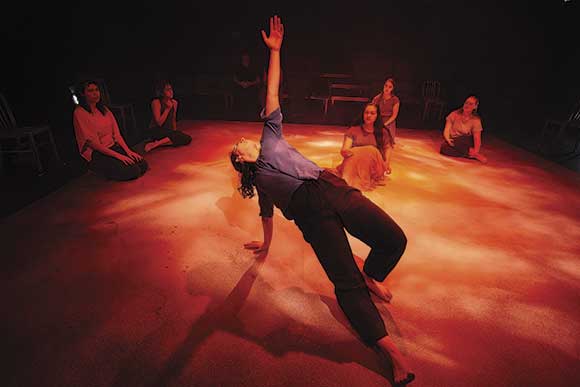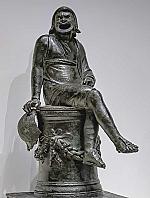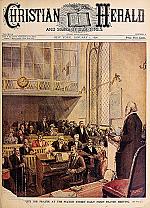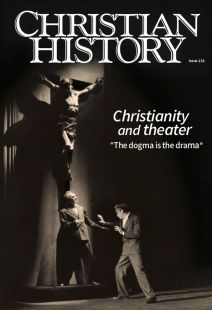Faith’s “Workout” on stage

[ABOVE: Scene from The Psalms, directed by Mark Lewis, Arena Theater, Wheaton College, 2023—Photo: Caspar Carter]
Mark Lewis is a Wheaton College professor and director of Wheaton’s theater program, Workout. Workout has a unique history that parallels Christian attitudes and responses to drama throughout the years. CH spoke with Lewis to find out more.
CHRISTIAN HISTORY: What is Workout and what is its relationship to theater at Wheaton?
Mark Lewis: Wheaton College does not have a theater major. For 50 years, what has operated instead is a theater ensemble called Workout. Founded in 1974 by Dr. Jim Young, Workout admits participants by audition. Typically there are between 35 and 45 students in the group. Most who gain entrance as freshmen stay in the group all four years. Requirements include regular attendance at two “Workouts” a week as well as a commitment to building, staffing, advertising, technically supporting, and acting in Arena Theater’s 3-play, 27-performance season.
CH: How did Workout start?
ML: Jim Young was an unlikely person to be Wheaton College’s first full-time theater professor. Raised in a fundamentalist Christian home of modest means in Michigan in the 1930s and 1940s, he first aimed to be a missionary. Arriving on campus in the early 1970s, he imagined theater at Wheaton would be a formal group rather than an academic major or a casual club. He liked to say that the name “Workout” came to him written across the sky. With the name, Jim was not seeking in any way to emulate the sweaty experience that has confused everyone for almost 50 years. Rather he imagined the activity of the group to be “working out faith, with fear and trembling,” as commanded in Philippians 2:12.
CH: This issue explores the often-conflicted relationship between Christians and theater. Is this tension still present, and if so, how has Workout navigated it?
ML: I think any Christian’s view of theater has everything to do with the process of their lived faith (shaped by the convictions of the communities that have formed them) and by what they think theater is and how they experience it. I have spent my life in evangelical circles, and I think that objections I have heard (or intuited) from Christians willing to speak about it are various. Some restate Plato’s objection to theater as being a harmful “lie” that distances us from reality. Additionally good theater operates both intellectually and emotionally, and some find this realm of feelings confusing to navigate.
Others struggle to reconcile their interaction with the physically embodied imagination. Being in the room with an event that is being cocreated in real time by an audience and a performer and is occurring very powerfully—maybe even most powerfully—in the imagination of the audience is hard for some to find peace with.
CH: Setzuan, Workout’s main ensemble room, has a stained-glass image of Genesius of Rome (see our Did you know?). How does he connect to the ethos of theater making at Wheaton?
ML: Jim Young gifted the stained-glass image to Workout. It hung for many years in his home. As far as his presence in the tradition of Workout (for 50 years, Workout seniors have been presented with Genesius medals at graduation), I have always attributed it to Dr. Young’s deep belief that, counter to evangelical tradition, it is not only possible to be both a committed theater artist and a committed Christian, but that a life in the theater can be met and pursued full-heartedly by a follower of Christ.
CH: You have devised and directed several iterations of KJV, a theater production centered around the text of the King James Version, and just last year you produced The Psalms. What inspired these projects?
ML: My parents brought me up to believe that memorization of Scripture has deep inherent value: “Hiding God’s word in my heart” in the Psalm 119:11 sense. The first KJV project was born simply out of the belief that it would be good for students in Workout to spend time first memorizing and then embodying some major chunks of Scripture.
What continues to surprise me is just how theatrically compelling these texts are for our audiences and our actors alike. I have come to realize that, while we often have the Bible read to us, we do not often hear it simply spoken. I believe it operates differently as embodied, unmediated text. If it really is sharper than a two-edged sword, maybe we should consider treating it less as a text we must illustrate to make clear, and more as a text that we should allow to operate theatrically in the way that any great text does. CH
By Mark Lewis and the editors
[Christian History originally published this article in Christian History Issue #152 in 2024]
Mark Lewis is a Wheaton College professor and director of Wheaton’s theater program, Workout.Next articles
Recommended resources: Christianity and theater
Read more about how Christians have participated in, created, and critiqued theater in these resources recommended by our authors and the CH team.
The editors and contributorsGlobal outpouring: Did you know?
Revivals of the nineteenth and twentieth centuries had global reach and impact
Chris Rogers and the editors






